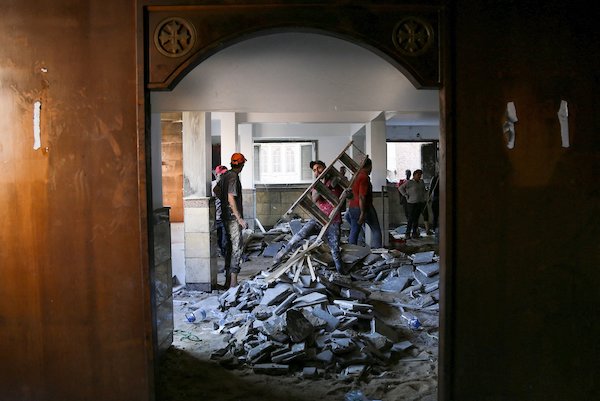
By Engy Magdy
CAIRO, Egypt — Cries of grief rose, and fingers of blame were pointed in the wake of a tragic fire that gutted Martyr Abu Sefein Coptic Church and claimed the lives of 41 people including 15 children and the church bishop, Abdul Masih Bakhit.
About 5,000 people were gathering on August 14 for Sunday Mass when the fire broke out at 8:30 a.m. inside the small four-story building in Imbaba, a working-class neighborhood five miles from Cairo.
Government officials said the deaths resulted from an ensuing stampede and smoke inhalation. Witnesses told The Tablet the first firefighters didn’t arrive for more than an hour-and-a-half after scores of trapped worshippers had already suffocated to death. As the fire spread to the upper floors, some screaming victims jumped out of windows.
Church officials said the blaze was caused by a short circuit in an air conditioner, but one news wire service reported that witnesses also pointed to a faulty generator. Neighborhood residents rushed to rescue the people inside the church as the emergency response was slow. The children died when they were trapped in a daycare room inside the church as the unchecked blaze engulfed the building, witnesses said.
“The firefighters came after the people died although they [were on] the next street [from] the church,” another witness said. “Even the bodies were laid in the street be- cause the ambulance was slow to arrive. Nobody cares about those poor souls.”
“For who should I live anymore?” asked Mina Atef, 30, who lost his mother, Magda, 61, and two sisters, Mirna, 22, and Ereeny, 34, who was the mother of three young children, Parthenia, Meriam, and Ibraam, who also died. Atef had lost his father 10 years ago.
“Since then, I felt that I’m the father of this family,” he said. “Also, Ereeny’s husband died last year, and I became the father of the three toddlers. I loved them very much and thought we will grow together.”
“I feel that they all are inside this hall now, we will go home together,” he added, pointing to the funeral hall, where the mourners came to offer their condolences.
Atef remembers that on the same day of the tragedy, his mother woke him up to go to the Sunday Mass with her. “I don’t go to the church regularly.”
“The day before [the fire], we had a family gathering, now I understand it was just a farewell,” Mariam, Magda’s sister, told The Tablet. “I remember how my niece, Ereeny, was happy as her two daughters were accepted in a good Catholic school. They were supposed to go to school next month, but now they all vanished.”
Others had similar heartbreaking tales of losing children to the killer blaze.
A day later, local media published a tragic video of a mother who lost her 5-year-old triplets — Mehrael, Yousef, and Philopater. Standing by her children’s caskets, raising her hand with a sign of “three,” she wept: “I lost them all. Why?”
Ironically, the tragedy came on the anniversary of the dispersing of the Islamists’ sit-in after the ousting of the Muslim Brotherhood Islamist group from ruling Egypt on July 3, 2013. That is when millions of Egyptians protested against the rule of president Mohamed Morsi — a prominent figure in the Muslim Brotherhood group — demanding that he leave power.
On August 14, 2013, the Islamists attacked and set ablaze 76 churches around Egypt when the security forces set out to disperse the Muslim Brotherhood sit-in in Nasr City’s Rabaa square, along with another sit-in located in Nahda Square, Giza.
The Muslim Brotherhood followers and some other Islamist groups blame Coptic Christians for protesting against Morsi, who was ousted by the Egyptian army.
Two days after the fire, the Anba Bishoy Church in Minya was badly damaged by a mysterious blaze that broke out in a closed room where 250 children, who had gathered for summer activities, had left just minutes before. There were no fatalities.
According to officials in the Interior Ministry, the Anba Bishoy fire was blamed on an electrical short circuit, but some observers doubted that conclusion. The two fires in such quick succession have some government critics questioning if extremists might be behind the blazes.
Others blamed the incidents on the discrimination that Coptic Christians face, whether they try to build a new church or rebuild an existing one. The Martyr Abu Sefein church is located on a very narrow street; it was built as a residential building without safety codes in an attempt to get around restrictions imposed by local authorities to prevent the construction of churches.
Covertly, Christians used to convert the residential buildings into places of worship, not only because of the authorities’ restrictions on the building of new churches but also out of fear of the Islamists, who, in many cases, use violence to stop the construction.
In a phone call with a local TV station, Coptic Christian Pope Tawadros II said the Martyr Abu Sefein Church, like many others, is too small for the number of congregants it serves and urged that authorities allow the building of more churches.
“In Egypt, major disasters mostly afflict the poor. Egypt is a very racist country … Muslims are more secure than Copts, and men are more secure than women and children, while the most vulnerable among Egyptians are those poor Coptic women and children, which is what happened in this poor church,” Mohamed Abou El-Ghar, leader of the Egyptian Social Democratic Party, wrote on his Facebook account on Aug. 15.
Abou El-Ghar criticized the discriminatory and bureaucratic obstacles that prevent building safe churches and called for more equality.
“The constitution clearly states that all Egyptians are equal, which means that Christians have the same rights as Muslims, and because Muslims build their mosques without problems, churches must also be built without problems,” El-Ghar said.
